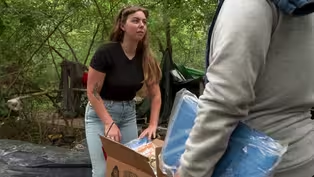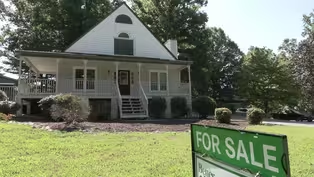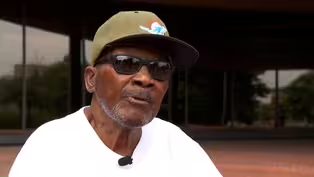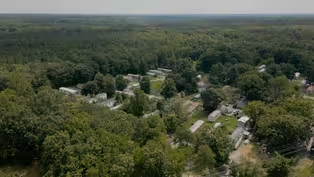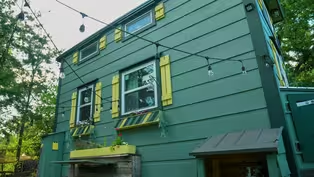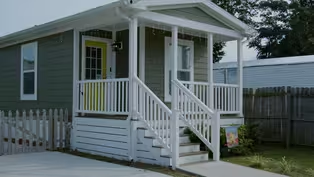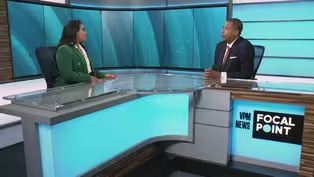VPM News Focal Point
Housing Costs | September 14, 2023
Season 2 Episode 12 | 26m 46sVideo has Closed Captions
Mobile home residents are fighting for their rights, Tiny homes and the eviction crisis
Virginia is facing an affordable housing crisis. We hear from people being evicted from their homes and residents of a mobile home park who are fighting for their rights. And we meet a family that built their own 149 square foot tiny home.
Problems playing video? | Closed Captioning Feedback
Problems playing video? | Closed Captioning Feedback
VPM News Focal Point is a local public television program presented by VPM
The Estate of Mrs. Ann Lee Saunders Brown
VPM News Focal Point
Housing Costs | September 14, 2023
Season 2 Episode 12 | 26m 46sVideo has Closed Captions
Virginia is facing an affordable housing crisis. We hear from people being evicted from their homes and residents of a mobile home park who are fighting for their rights. And we meet a family that built their own 149 square foot tiny home.
Problems playing video? | Closed Captioning Feedback
How to Watch VPM News Focal Point
VPM News Focal Point is available to stream on pbs.org and the free PBS App, available on iPhone, Apple TV, Android TV, Android smartphones, Amazon Fire TV, Amazon Fire Tablet, Roku, Samsung Smart TV, and Vizio.
Providing Support for PBS.org
Learn Moreabout PBS online sponsorshipKEYRIS MANZANARES: They say, home is where the heart is, but finding a place to call home is a challenge for so many across the commonwealth.
In this episode, we'll explore how the soaring cost of housing is making it difficult for renters and buyers.
We'll join one woman on her hunt for a home and meet a couple who made big changes by going small.
You're watching VPM News Focal Point.
Production funding for VPM News Focal Point is provided by The estate of Mrs. Ann Lee Saunders Brown.
And by... ♪ ♪ KEYRIS MANZANARES: Welcome to VPM News Focal Point.
I'm Keyris Manzanares in for Angie Miles.
We're considering how much Virginians are paying for a place to live.
Costs are rising and full-time workers earning Virginia's minimum wage can't afford a one-bedroom apartment.
That's according to the National Low Income Housing Coalition.
And Virginia realtors say that sales are declining due to steep prices and housing shortages.
In August, mortgage rates soared above 7% hitting a 20-year high.
That's putting home buyers in a bind.
News producer Adrienne McGibbon explores why it's so hard to find statewide solutions to the housing crunch.
JOANNE RICHARDS: It's so competitive right now.
ADRIENNE MCGIBBON: Joanne Richards is looking for a home to retire in.
JOANNE RICHARDS: There's so many, so many people vying for the same property.
Every time something good hits the market, you know, you just know you have to get right on it.
Otherwise, there's absolutely no chance of getting it.
ADRIENNE MCGIBBON: She's made offers on three houses in three months, going above asking and waiving inspections, but nothing has come through.
She says she has the luxury of time and the finances to cover the costs, but she worries about her children and other first-time homebuyers.
JOANNE RICHARDS: How do you save for the down payment?
And then once you get into the position where you think you can buy a home, then the mortgage interest rates start going up, and that can throw you out immediately.
ADRIENNE MCGIBBON: Virginia housing expert Jenny Schuetz says Virginia is complicated.
JENNY SCHUETZ: It's pretty large, and it has really different housing markets in different parts of the state.
ADRIENNE MCGIBBON: Virginia has expensive urban markets without enough properties, areas like Richmond that are seeing population booms, and rural areas losing populations with older and vacant homes.
JENNY SCHUETZ: It's a long way from the southwest tip all the way to the Atlantic Ocean, and you cover everything in between.
That makes it really challenging for the state, for instance, to have some kind of a coherent housing policy, because they're really trying to come up with policies that fit lots of different local circumstances.
ADRIENNE MCGIBBON: Schuetz says the key is to make sure communities build more housing with a wider range of prices.
Joanne says she's considering taking a break from her home hunting until the market cools.
KEYRIS MANZANARES: The Federal Reserve Board which sets interest rates is scheduled to meet this month.
The Fed raised rates a quarter point in July to help tamp down inflation.
Board members have indicated another increase could happen before the end of the year, further impacting home prices.
KEYRIS MANZANARES: We asked people of Virginia what factors are influencing whether people can find safe and affordable housing.
Here are some of those points of view.
KEVIN CRAWFORD: The rising costs is not meeting rising income needs.
So like people arent making, so if you're getting a raise, 3% a year, but inflation's raising 10% a year, then something's got to give.
It's kind of what's going on.
BRANDON HAWKINS: Rent has gone up, the cost of living has gone up in general, even for basic amenities and it's definitely houses going up with that too.
I think houses even here are overpriced, overvalued, and due to inflation and rising rates, they're harder to get borrowers and people to buy 'em.
CHRIS SALADINO: I think broadly conceived the economy's a problem, but I also don't know that affordable housing is something that people want to invest in.
I don't think that people who build and people who renovate are looking for people who need houses as much as they're looking for profit, which makes sense, but that's a problem.
KEYRIS MANZANARES: Across the commonwealth, people are feeling the pressure when looking for budget-friendly housing.
60% of Virginia's renters saw increases this year, according to the RVA Eviction Lab at Virginia Commonwealth University.
Richmond has one of the highest eviction rates in the country.
And the city council recently passed a resolution declaring a housing crisis.
As multimedia journalist Billy Shields reports, those evictions are hitting some of Richmond's most vulnerable residents.
BILLY SHIELDS: This is retired handyman Terry Scott.
At 66, he just spent three months in the hospital for heart bypass surgery.
And that is when the eviction notices started coming in.
TERRY SCOTT: Stressing me out.
It's totally stressing me out, you know what I mean?
Stressing me the out, that's what I mean, yeah.
And that, I mean, what I could do, 'cause I, you know, I'm in there.
BILLY SHIELDS: Scott was lucky that community healthcare worker Shantea Swinson was assigned to help him recover from the surgery.
She also volunteered to advocate on his behalf in the eviction.
SHANTEA SWINSON: And I realized that they were suing him for non-payment of rent for two months.
When I started looking through his paperwork, I realized he had already overpaid.
BILLY SHIELDS: And this is the third time Scott's been to court this year, all for the same reason, to fend off eviction.
He's one of the lucky ones.
He can pay his rent.
Thousands of Richmonders who can't are being kicked to the curb.
OMARI AL-QADAFFI: Right now, it does not seem like there is any effort in Richmond to address those who are at a lowest income.
And I mean those that are at zero to 30% of the area median income.
It does not seem like there's any effort specifically.
BILLY SHIELDS: In 2018, the city of Richmond made national headlines for having the second highest eviction rate of major American cities.
Pandemic measures lowered that rate, but only for a bit.
MARTIN WEGBREIT: Now it's probably, it's creeping upward.
It's, you know, probably 12, 13, 14,000 per year, if you annualize it.
BILLY SHIELDS: Attorney Martin Wegbreit says far too many Richmonders are paying more than they can afford for housing, many spending more than half their income just to keep a roof over their head.
MARTIN WEGBREIT: If you're paying more than half of your income for rent, an eviction lawsuit is not just a possibility.
It is an inevitability.
BILLY SHIELDS: Recently we were in a Richmond courtroom, where a single judge heard more than 150 eviction proceedings in one day, some over outstanding amounts under $400.
Wegbreit points to a few problems.
One is how inexpensive it is for a landlord to file an eviction lawsuit.
In Virginia, it's around $60.
In North Carolina, that fee is around $150.
And in Alabama, it's over 250.
Wegbreit also notes that legally, a landlord can file an eviction lawsuit if rent is more than 11 days late.
He recommends the state adopt a timeframe of at least 14 days, which all but guarantees a typical employee will get a paycheck before being evicted.
Now that pandemic rent forgiveness is over, the situation is deteriorating.
OMARI AL-QADAFFI: But after the pandemic protections ended, I never had to tell so many people that, "We can't help you."
BILLY SHIELDS: Advocates can't help because of the severe housing shortage across the state, particularly in Richmond.
KELLY KING HORNE: Deodorant, snacks, wipes, and- BILLY SHIELDS: Kelly King Horne is the executive director of Homeward.
It's a regional support agency that aims to reduce homelessness in the greater Richmond area.
KELLY KING HORNE: That the housing market is complex, but generally, we are not building and developing enough housing for all parts of our community.
BILLY SHIELDS: Virginia legislators enacted meaningful eviction reforms in 2019, 2020, and 2021, but advocates say they don't go far enough.
Meanwhile, back in court, with help from his hospital caregiver, Terry Scott was able to convince the judge to dismiss his eviction case.
He is angry at his landlords.
TERRY SCOTT: It's like it's a game, you know what I mean?
It's like a game they play.
They don't care.
They go home and sleep in their bed, and do what they want and get up in the morning, and try somebody else.
SHANTEA SWINSON: If Mr. Scott had not come to court, they would have automatically assumed he owed, and they would've went at judgment for him.
This property hasn't shown up three times, so who's going to hold them accountable for what they've done?
BILLY SHIELDS: Angered he had to appear in court at all, Scott is hoping this is the last time he has to take these steps to avoid eviction.
KEYRIS MANZANARES: The RVA Eviction Lab says there are opportunities to improve the system, such as creating a publicly available rental registry, showing how properties are managed and listing their rental cost.
The lab directors say those measures and others may be effective in stemming the tide of evictions.
ANGIE MILES: VPM News Focal Point is interested in the points of view of Virginians.
To hear more from your Virginia neighbors, and to share your own thoughts and story ideas, find us online at vpm.org/focalpoint.
KEYRIS MANZANARES: Mobile home parks historically have offered an affordable option for people to own their residences.
But in recent years, private investment groups have shown interest in manufactured housing communities and have begun buying up the land leased by those homeowners.
This has resulted in rate hikes that community members struggle to pay.
Like in Louisa County, where residents of one mobile home park are fighting a 40% rent increase.
I traveled there in collaboration with Mark Robinson from the Economic Hardship Reporting Project to explore this story.
(hoe crunching) KEYRIS MANZANARES: On Sundays, 46-year-old Gabino Felipe likes to work in his yard, tidying up and trimming the brush that grows wild around his home.
He lives at Six-O-Five Village Mobile Home Park in Mineral, about an hour northwest of Richmond.
Felipe, who works fixing machinery at a nearby factory, shares this trailer with his sister and niece, and for the last six years, he's called this place home.
(Keyris speaking Spanish language) (Gabino speaking Spanish language) (speaking in Spanish continues) KEYRIS MANZANARES: But for Felipe and dozens of others, the cost of living here has spiked.
In December, Homes of America LLC, a private investment group that now owns Six-O-Five Village Mobile Home Park tried to raise the rent by more than 40%.
Overnight, the monthly cost of Felipe's lot went from $445 to $625.
(Gabino speaking Spanish language) (Speaking Spanish language) KEYRIS MANZANARES: Felipe says there have been no obvious infrastructure changes, such as repaving the main road or improving the park's drainage system, that would justify the rent hike.
(Gabino speaking Spanish language) (Gabino speaking Spanish language) (Family members speaking Spanish language) KEYRIS MANZANARES: But even more worrying is finding a new place to live.
Affordable housing is in extremely short supply throughout the state.
In Louisa County, the rent for an apartment the size of Felipe's trailer would cost more than twice as much as he currently pays.
Felipe owns his trailer, but he does not own the land it sits on, and despite the popular term mobile home, his house, like most trailers in these parks, can't be moved.
Gustavo Espinosa from Legal Aid Justice Center has been working with Felipe and the residents of the park.
GUSTAVO ESPINOSA: Living in one of these communities is a very precarious position to be in because you've, and especially if you're a homeowner, you've invested or you're investing, like, thousands and thousands of dollars.
You bought a trailer, but you don't own the land underneath it, so the landlord can just not renew your lease, or they can offer you a lease that's something that would be impossible for you to pay, and you have to leave, and because the trailers are more or less stuck, you would lose that investment unless you could sell it.
(Gabino speaking Spanish language) (speaking in Spanish continues) KEYRIS MANZANARES: Mobile home parks, one of the last and most affordable housing options, are experiencing rapid acquisition by large investment firms.
According to the Manufactured Home Community Coalition of Virginia, 84% of mobile home parks that sold in the last five years went to out-of-state buyers.
While there are no official numbers, the nonprofit believes that these investment groups, like the one that bought Six-O-Five Village, are driving the sales.
This follows a nationwide trend of private investors aggressively acquiring a portfolio of wide-ranging businesses from hospitals to daycares to newspapers and squeezing deep profits out of them.
SEN. GHAZALA HASHMI: So a lot of those challenges and struggles really center around that these parks may be sold, sold to outside corporations, corporations that are not even Virginia-based, and that they will have new landlords who will raise rent exponentially, and that they will not be able to remain where they have been living for many, many years.
KEYRIS MANZANARES: Senator Ghazala Hashmi has proposed legislation that would incentivize mobile home park owners to sell to nonprofit groups rather than to private corporations.
That bill has not yet passed.
(Gabino speaking Spanish language) (speaking in Spanish continues) KEYRIS MANZANARES: Felipe says residents at the park are harassed each week with rent reminders like these, and others, like his neighbor Georgina Gonzalez Gomez, says new owners are trying to buy her family out.
(Georgina speaking Spanish language) KEYRIS MANZANARES: Felipe says he's already seen some neighbors move out, leaving behind empty or abandoned trailers.
KEYRIS MANZANARES: Last spring, left with few options, Felipe formed a residents organization with his neighbors to fight the new owners.
RESIDENT: Thank you for the air conditioner.
GABINO FELIPE: All right.
RESIDENT: You are a blessing to us.
Thank you.
GABINO FELIPE: All right, you're welcome.
(Gabino speaking Spanish language) VICTORIA HORROCK: So what, essentially, the park has done is they increased the rent in December 2022 by 40%.
They did that without any notice.
That's the heart of the legal case.
KEYRIS MANZANARES: Victoria Horrock is representing Felipe and 14 other residents of the community in lawsuits filed against the new owners of Six-O-Five Village Mobile Home Park.
VICTORIA HORROCK: The Manufactured Home Lot Rental Act requires that a park gives 60 days notice before a rent increase goes into effect.
Many of these people were mid-lease when this rent increase happened.
KEYRIS MANZANARES: The Louisa General District Court will consider the lawsuits later this month.
A lawyer representing Homes of America in the lawsuits did not answer questions VPM sent for the park owners during production of this story.
For now, Felipe continues to pay the rent listed on his current lease while waiting for the case to go to trial.
(Gabino speaking Spanish language) KEYRIS MANZANARES: A Louisa General District Court judge is set to hear the case against Homes of America, LLC, brought forth by Felipe and 14 other residents of Six-0-Five Village Mobile Home Park, later this month.
A lawyer representing the corporation provided VPM News with a statement saying that since purchasing the park their client has renovated homes, addressed deferred maintenance and improved infrastructure while also working with community members to clean up the property.
The statement did not address the rent increase, but said the owners look forward to making Six-0-Five a quote, "...outstanding place to live."
Part two of this story focuses on a different property in Chesterfield County.
Find out why state and local leaders say this community should serve as a model for how to preserve affordable housing at mobile home parks statewide.
Watch online at vpm.org/focalpoint.
KEYRIS MANZANARES: Many people across the Commonwealth live in places that are subsidized by government funding.
Recently, Virginia Governor, Glenn Youngkin announced $52 million in loans for affordable housing projects across the state, of which Richmond will receive $13 million.
Joining us to talk about how that money will be spent is Steven Nesmith, CEO of Richmond Redevelopment and Housing Authority.
Will you tell us a little bit about the role that RRHA plays in the Richmond community?
STEVEN NESMITH: First of all, we are the largest public housing authority in the Commonwealth of Virginia, located in Richmond.
We serve about 4,000 families in the City of Richmond and we're also the largest landowner and redevelopment authority as well.
KEYRIS MANZANARES: This week you've made an announcement relating to a program that you're rolling out called Hopes, Jobs and Security.
Can you tell us more about that initiative and how is it different from previous efforts to provide programming and training for residents?
STEVEN NESMITH: It's different because most housing authorities, when they see there is crime, they'll come in with a security force.
What we're saying is we invest doing early intervention and investment in the residents.
We've identified public-private partnerships that are going to go in and provide free job training and at the end of that training, specific job opportunities.
We are bringing in a group that's going to do conflict resolution and deescalation training for public housing residents, young people who might want to grab for a gun or a weapon to say, "Let's deescalate and try to work on our problems."
We don't want our public housing residents to even come in contact with security officers or nor the police.
We want to do early investment so they can find a place of hope and opportunity to succeed to a place of self-sufficiency.
And so that's the goal.
KEYRIS MANZANARES: Thank you for joining us.
Steven Nesmith, CEO of Richmond Redevelopment and Housing Authority.
STEVEN NESMITH: Thank you for having me.
(upbeat music) ANGIE MILES: You can watch the full interview on our website.
KEYRIS MANZANARES: Tiny homes are a hot trend, the focus of TV shows and a popular option for Airbnbs.
But these small dwellings are more than just a fad.
They offer an alternative to high-cost housing and demand for them grows larger.
Senior producer Roberta Oster has the story.
MELANIE COPELAND: My name is Melanie Copeland.
We are sitting in a 144-square-foot tiny house on wheels that my husband and I and three friends built in seven days.
So it's 18 feet long, eight feet wide, 13 feet, six inches tall, which is road safe, like can't have them any taller than that without permits to move them.
We both did go to college.
I have two degrees, my husband has two degrees.
I had gone through a multitude of layoffs, six in seven years.
And I'm thinking, I did all this education for what?
Like, I can't even, I'm just going to get laid off again.
I'm going to get outsourced.
And we were working five jobs between two people.
So were not being lazy, and we were still not making it.
The rent, the student loans, the car payments.
As soon as you would get some money up in savings and get going, it's like, oh, well the car would break, or the dog needs this.
I came home, it was right before Christmas, I had had another layoff, and I said, I'm done.
I don't feel anything in my soul anymore, because I'm just trying to pay the next bill.
And I'm like, if we stay in this, we're going to lose our marriage.
We had no chance at retirement, zero.
Retirement was die, work till you die.
All right, here we go, heading on to East 64.
So I built the tiny house, and I sold everything, and I said, ‘Well, guess what?
I don't have anything to lose anymore.
Now I can go do what I want to do.
And right now, for a lot of people, they're priced out of homes, completely priced out of homes.
So if you can't afford a 200, 300, 400, $500,000 home, maybe you could afford a 30, 40, $50,000 tiny house.
And it's a place to start.
So the garden has corn, which is our first time growing that this year.
And we have spaghetti squash, along with butternut squash coming up this trellis.
Obviously, we have tomatoes, and then we have kale and green beans and all kinds of stuff growing.
The kitchen's pretty easy space to work together out of the whole tiny house, because we each have a side.
So he can kind of cut on one side I can cook on the other.
It's actually pretty usable space.
I believe tiny homes is an excellent solution for many, many different people across the board.
I mean, it can certainly help people who are just getting out of college and don't know where their permanent jobs are going to be yet.
So they may graduate in one state, take their house, and travel to another state, and live there and start working before they buy a home.
Traveling nurses can do the same type of thing.
There's so many benefits to having tiny houses or tiny houses on wheels in your community.
And I'm the national spokesperson for the Tiny House Alliance USA.
I speak at a global level.
I deal with local level zoning officials and building inspectors all over.
I talked to them about codes.
So tiny houses on wheels are different than a tiny house on a foundation.
Tiny houses on foundations usually have to follow state building codes.
It's time to change zoning laws and build smaller homes or create communities that benefit people, and not the dollar at the end of the day.
And we did it.
So we took the chances and they paid off for us.
And now we travel, and we'll retire early, and everybody should have that chance.
KEYRIS MANZANARES: From creative solutions for lower cost living to looming evictions and rising rents, many Virginians are fighting for ways to stay in their homes.
For more coverage including our full interview with the Richmond Redevelopment and Housing Authority CEO, visit vpm.org/focalpoint.
There you'll also find a story about efforts to address rising homelessness around Staunton, Virginia.
Thank you for joining us, and we'll see you next time.
Production funding for VPM News Focal Point is provided by The estate of Mrs. Ann Lee Saunders Brown.
And by... ♪ ♪
Video has Closed Captions
Clip: S2 Ep12 | 4m 10s | One community is addressing homelessness with a personal approach. (4m 10s)
Video has Closed Captions
Clip: S2 Ep12 | 1m 47s | House hunters are struggling to afford homes. Why is it so difficult in Virginia? (1m 47s)
Evictions Crisis: How Did Richmond Get out of Control?
Video has Closed Captions
Clip: S2 Ep12 | 4m 7s | With pandemic measures over, Richmond’s eviction rate is ticking up again. But why? (4m 7s)
The fight to keep a Virginia mobile home park affordable
Video has Closed Captions
Clip: S2 Ep12 | 7m 51s | Residents at a mobile home park in Louisa County are facing a 40 percent rent increase. (7m 51s)
Meet a couple that loves their 144-square-foot tiny home
Video has Closed Captions
Clip: S2 Ep12 | 3m 43s | One of the growing options for affordable housing is getting really small. (3m 43s)
Video has Closed Captions
Clip: S2 Ep12 | 7m 41s | Project Homes is providing high quality housing at an affordable rate at Bermuda Estates. (7m 41s)
“Self-Sufficiency" Goal for Richmond Redevelopment & Housing
Video has Closed Captions
Clip: S2 Ep12 | 7m 17s | Richmond Redevelopment & Housing Authority launches new Hope, Jobs and Security initiative (7m 17s)
Providing Support for PBS.org
Learn Moreabout PBS online sponsorship
- News and Public Affairs

Top journalists deliver compelling original analysis of the hour's headlines.

- News and Public Affairs

FRONTLINE is investigative journalism that questions, explains and changes our world.












Support for PBS provided by:
VPM News Focal Point is a local public television program presented by VPM
The Estate of Mrs. Ann Lee Saunders Brown
